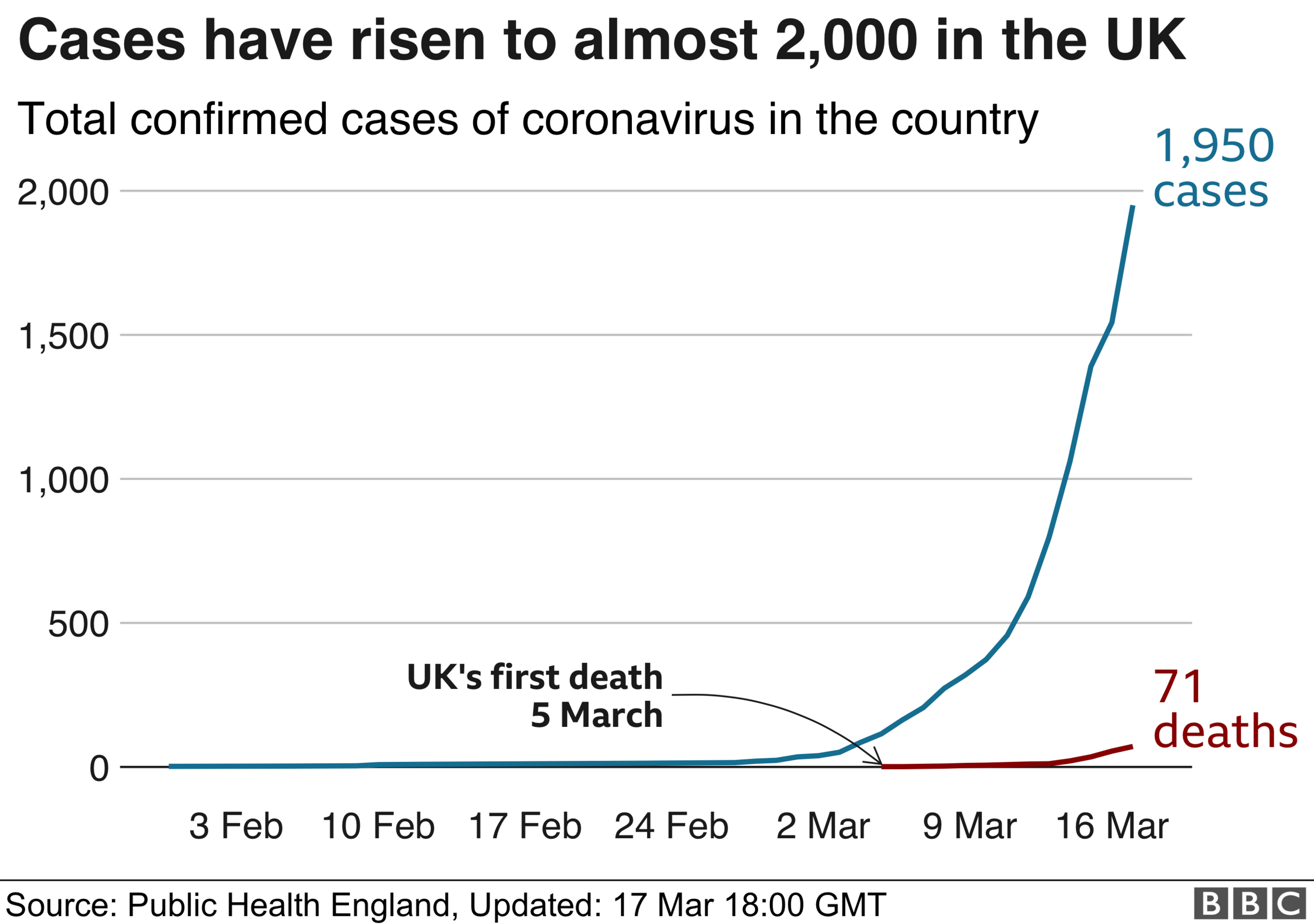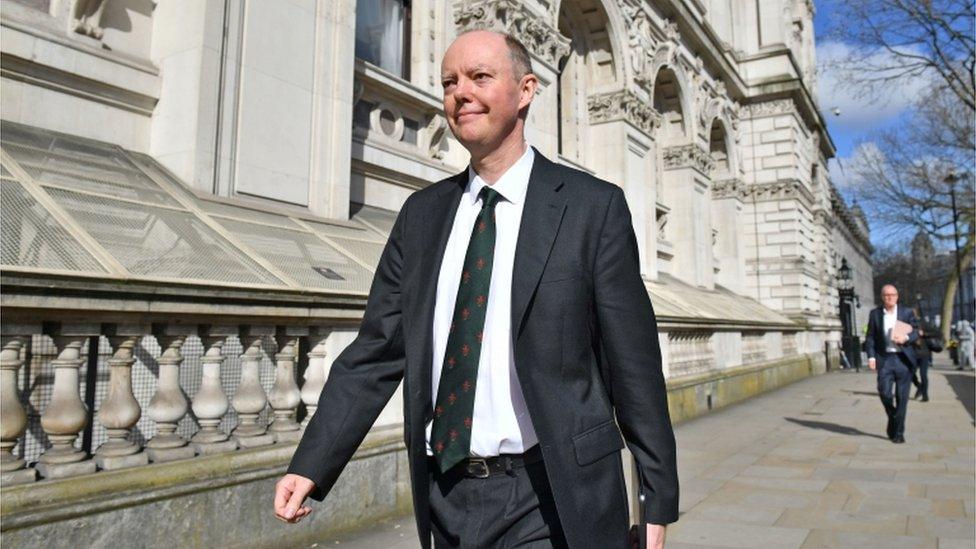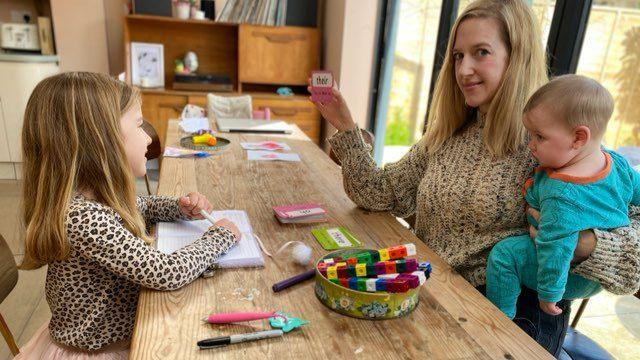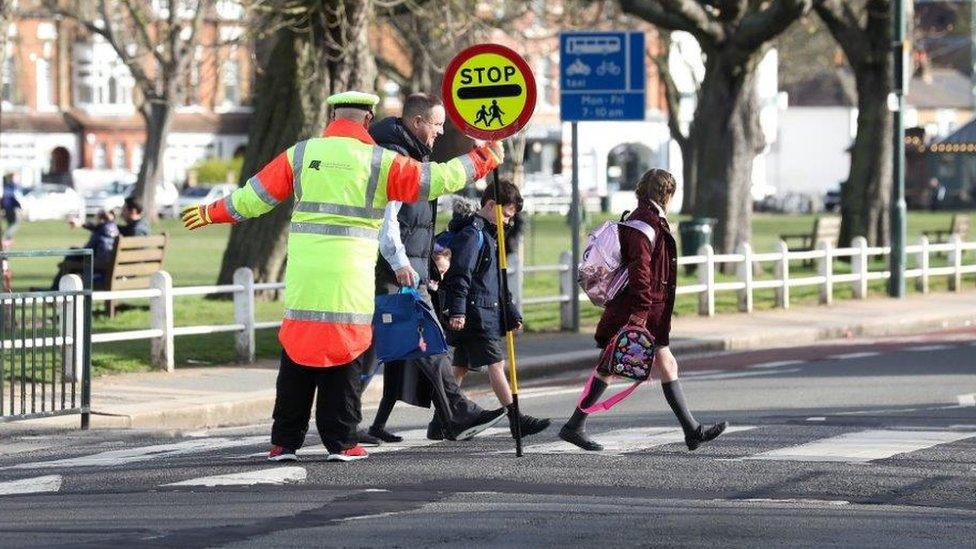Coronavirus: Emergency cash to help businesses, while operations delayed
- Published
Rishi Sunak: "We have never in peacetime faced an economic fight like this one"
Chancellor Rishi Sunak has unveiled an "unprecedented" set of financial measures to support the UK economy through the coronavirus pandemic.
They include mortgage "holidays" for those in financial difficulty as well as £330bn in loans and £20bn in other aid to protect businesses facing losses as a result of the virus.
Meanwhile all non-urgent operations in England and Scotland will be postponed to free up beds for virus patients.
It comes as the UK death toll hit 71.
The government's chief scientific adviser Sir Patrick Vallance said it would be a "good outcome" for the UK if the number of deaths from the virus could be kept below 20,000.
"Never in peacetime have we faced an economic fight like this one," Mr Sunak said at a Downing Street press conference, as he detailed measures to ease financial burdens caused by the virus.
The chancellor said the £330bn in loans - equivalent to 15% of GDP - would be available from next week to help businesses pay for supplies, rent and salaries.
Other measures to be put in place include extended business rates relief and a three-month mortgage holiday for people in financial difficulty as a result of the virus.
"We must act like any wartime government and do whatever it takes to support our economy," Prime Minister Boris Johnson said at the same conference.
Labour's shadow chancellor John McDonnell said there was nothing in the statement to protect renters - although Mr Sunak said measures would be announced in the "coming days".
Mr McDonnell also called for statutory sick pay to be increased and for those losing their jobs to be given some support.
And unions raised concern that no measures were announced to help freelancers and people working in the so-called gig economy,
Boris Johnson: "We must act like any wartime government"
NHS England's chief executive Sir Simon Stevens said postponing routine surgery from 15 April would help to expand critical care capacity to the maximum - to prepare for "the likely influx of more coronavirus patients".
The emergency policy to free up 30,000 beds will be in place for at least three months, he said.
However, cancer operations will continue to go ahead, Sir Simon added.
Sir Simon said the health system in England has about 7,000 ventilators and there are plans to increase this to 12,000.
British engineering firms have been called on to switch to making medical ventilators to help efforts to cope with the virus, which causes the disease Covid-19.
The government set out emergency legislation, external before MPs in the Commons to tackle the outbreak, including measures giving powers to police and immigration officers to detain people and put them in isolation to protect public health.
In another day of fast-changing developments across the globe:
The Foreign Office advised British nationals to avoid all non-essential foreign travel for at least 30 days
The European Union will seal its borders for 30 days
The number of deaths in Italy has passed 2,000 and the total in Spain has reached nearly 500
US primary elections have been thrown into uncertainty as polling stations closed
The Euro 2020 tournament has been postponed until 2021
An International Olympic Committee member says plans for the Tokyo games to go ahead are "insensitive and irresponsible"
All horse racing in Great Britain will be suspended from Wednesday until the end of April
In tennis, the French Open has been postponed until September
All McDonalds restaurants in the UK and Ireland will become takeaways, drive-through and delivery operations
Meanwhile Sir Patrick said that, despite the upcoming Mother's Day celebration, the over-70s should avoid having Sunday lunch with their families.
He also advised people taking painkillers to use paracetamol instead of ibuprofen, after French health officials indicated anti-inflammatory drugs could worsen the virus - a suggestion Sir Patrick said "may or may not be right".
BBC news online health editor Michelle Roberts said up to 15,000 of England's 100,000 hospital beds could be freed up for coronavirus admissions by discharging other patients who are well enough to go home or be cared for in the community.
She added that Sir Simon would not say whether the measures will ultimately be enough to ease the pressure on the NHS.
Scottish Health Secretary Jeane Freeman said emergency measures by the NHS in Scotland would also include doubling the number of intensive care beds.

The number of people who have died with the virus in the UK has reached 71, after a second death was confirmed in Scotland, as well as a second in Wales. and a further 14 in England.
Some 1,950 people have tested positive for the virus in the UK, according to the latest Department of Health figures, external - but the actual number of cases could be as high as 55,000.
Sir Patrick told the health select committee that a death rate of one fatality for every 1,000 cases was a "reasonable ballpark" figure, based on scientific modelling.
More than 50,000 people have been tested for the virus in the UK, but the government is primarily testing people who are in hospital. This means many people who have mild symptoms may never be diagnosed with the virus.
Dominic Raab: "I have taken the decision to advise British national against international travel, globally"
Earlier the Foreign Office advised British nationals to avoid all non-essential foreign travel.
The restrictions will be in place for 30 days initially but could be extended, the Foreign Secretary Dominic Raab told the House of Commons.
It is the first time the UK has advised against foreign travel anywhere in the world.
"UK travellers abroad now face widespread international border restrictions and lockdowns in various countries," Mr Raab said in a statement.
"The speed and range of those measures across other countries is unprecedented."

A SIMPLE GUIDE: What are the symptoms?
AVOIDING CONTACT: Should I self-isolate?
LOOK-UP TOOL: Check cases in your area
MAPS AND CHARTS: Visual guide to the outbreak

British people currently abroad do not have to immediately return to the UK - except for those in a few countries detailed in the Foreign Office's travel advice, external.
But the Foreign Office said travellers should bear in mind that flights could be cancelled at short notice as foreign countries grapple with restrictions being imposed by their own authorities.
The foreign secretary added the government would issue advice on how the flow of food and goods to the UK can be maintained, and that staff working on shipping routes should continue to do so as their travel was "essential".
The travel advice for British nationals has in part been brought in because of the stringent social distancing measures announced by Boris Johnson on Monday.
Boris Johnson: "It look as though we are now approaching the fast growth part of the upward curve"
The key new measures, external the prime minister announced included:
Everyone should avoid gatherings with friends and family, as well as large gatherings and crowded places, such as pubs, clubs and theatres
People should avoid non-essential travel and work from home if they can
All "unnecessary" visits to friends and relatives in care homes should cease
People should only use the NHS "where we really need to" - and can reduce the burden on workers by getting advice on the NHS website, external where possible
By next weekend, those with the most serious health conditions must be "largely shielded from social contact for around 12 weeks"
If one person in any household has a persistent cough or fever, everyone living there must stay at home for 14 days
Those people should, if possible, avoid leaving the house "even to buy food or essentials" - but they may leave the house "for exercise and, in that case, at a safe distance from others"
While schools will not be closed for the moment, a union leader has described the "intolerable pressure" teachers are under as a result of the lack of clarity about pupil and staff safety.
Sir Patrick said closing schools remained an option to help curb the spread of the virus but would cause an "enormous problem" for the workforce.
He told MPs such an intervention could have "all sorts of complicated effects" such as that children off school might have to be looked after by elderly grandparents.
'A war we must win'
At a cabinet meeting earlier, Mr Johnson told ministers: "We are engaged in a war against the disease which we have to win."
Mr Johnson has set up a daily meeting about the virus, which he will chair.
In other developments in relation to coronavirus:
The Queen will move to Windsor Castle on Thursday - a week earlier than usual at this time of year. She is likely to stay there beyond the Easter period, Buckingham Palace said, external
Ofsted inspections are being halted to "remove unnecessary burdens" on schools, the Education Secretary Gavin Williamson said
Gatwick Airport said it has terminated the employment of 200 staff as part of "decisive action to protect the business"
Nissan has suspended production at its Sunderland factory, which employs around 7,000 people
The Royal Albert Hall and the British Museum are among the latest cultural venues to close their doors - following theatres, museums, and most cinemas
Center Parcs announced, external the closure of all its UK parks from 20 March to 16 April
The Archbishops of Canterbury and York have said all Church of England services and other public worship should be suspended until further notice, external - although weddings and funerals can still go ahead, a spokesman said
Workers at Amazon's UK warehouses are being told to do overtime to tackle huge demand
And the UK's mobile networks are experiencing problems as people follow government guidance to work from home

Have you been affected by travel restrictions? Are you struggling to get back to the UK from overseas? Share your experiences by emailing haveyoursay@bbc.co.uk, external.
Please include a contact number if you are willing to speak to a BBC journalist. You can also contact us in the following ways:
WhatsApp: +44 7756 165803
Tweet: @BBC_HaveYourSay, external
Send pictures/video to yourpics@bbc.co.uk, external
Please read our terms & conditions and privacy policy
- Published17 March 2020

- Published17 March 2020

- Published17 March 2020

- Published6 October 2021
